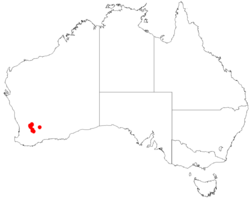Biology:Leucopogon amplectens
| Leucopogon amplectens | |
|---|---|
| Scientific classification | |
| Kingdom: | Plantae |
| Clade: | Tracheophytes |
| Clade: | Angiosperms |
| Clade: | Eudicots |
| Clade: | Asterids |
| Order: | Ericales |
| Family: | Ericaceae |
| Genus: | Leucopogon |
| Species: | L. amplectens
|
| Binomial name | |
| Leucopogon amplectens Ostenf.[1]
| |

| |
| Occurrence data from AVH | |
Leucopogon amplectens is a species of flowering plant in the family Ericaceae and is endemic to the south-west of Western Australia. It is an erect shrub that typically grows to a height of 30–75 cm (12–30 in) and has tube-shaped, white flowers from April to June.[2]
It was first formally described in 1921 by Carl Hansen Ostenfeld in the journal Biologiske meddelelser, Kongelige Danske Videnskabernes Selskab from specimens collected near Tammin.[3] The specific epithet (amplectens) means "embracing", referring to the leaves.[4]
Leucopogon amplectens grows in sandy soils in the Avon Wheatbelt and Mallee bioregions of south-western Western Australia and is listed as "Priority Two" by the Western Australian Government Department of Biodiversity, Conservation and Attractions,[2] meaning that it is poorly known and from only one or a few locations.[5]
References
- ↑ "Leucopogon amplectens". Australian Plant Census. https://biodiversity.org.au/nsl/services/apc-format/display/106691.
- ↑ 2.0 2.1 "Leucopogon amplectens". FloraBase. Western Australian Government Department of Parks and Wildlife. https://florabase.dpaw.wa.gov.au/browse/profile/6356.
- ↑ "Leucopogon amplectens". APNI. https://id.biodiversity.org.au/instance/apni/536782.
- ↑ Sharr, Francis Aubi; George, Alex (2019). Western Australian Plant Names and Their Meanings (3rd ed.). Kardinya, WA: Four Gables Press. p. 131. ISBN 9780958034180.
- ↑ "Conservation codes for Western Australian Flora and Fauna". Government of Western Australia Department of Parks and Wildlife. https://www.dpaw.wa.gov.au/images/documents/plants-animals/threatened-species/Listings/Conservation%20code%20definitions.pdf. Retrieved 21 June 2022.
Wikidata ☰ Q17242487 entry
 |


